|
|
|
Sort Order |
|
|
|
Items / Page
|
|
|
|
|
|
|
| Srl | Item |
| 1 |
ID:
165729
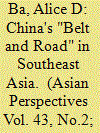

|
|
|
|
|
| Summary/Abstract |
China's Belt and Road Initiative (BRI) is viewed by most as symbolic of a new era of Chinese initiative and ambition. But while much attention has focused on how the BRI fits into China's—and specifically Xi Jinping's—grand narrative of national rejuvenation, less has been said about regional narratives—that is, the narratives of China's target audiences. Toward addressing this oversight, I consider the case of Singapore in relation to BRI. Specifically, I give attention to strategic narratives that offer analytic windows into the complex relationships being negotiated between China and Southeast Asian states. Strategic narratives, as instruments of policy, also play roles in constructing the strategic space in which BRI enters, with implications for the opportunities and constraints faced by China in Southeast Asia.
|
|
|
|
|
|
|
|
|
|
|
|
|
|
|
|
| 2 |
ID:
186202
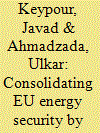

|
|
|
|
|
| Summary/Abstract |
Aiming to protect energy security, the European Union (EU) has sought to persuade third states to accept its energy acquis, relying on a formed strategic narrative. However, the coherency of this strategic narrative, as the prerequisite for being well-received, has not been studied before. Considering the strategic narrative theory and applying the content analysis method, our research has indicated that the EU’s narrative consists of five storylines, including geopolitics, the single energy market, and climate change, the last two of which have become increasingly accentuated over time. However, this strategic narrative suffers from two significant incoherencies, which lie between its storylines and also within the storyline. The results of our analyses indicate that both incoherencies originate from the securitisation of energy in the Union. This means that the effectiveness of the narrative formulated has been diminished, which is detrimental even to the EU’s climate policy. This could suggest that de-politicisation of energy is required to reinforce the narrative and enable the EU to address the world with one voice.
|
|
|
|
|
|
|
|
|
|
|
|
|
|
|
|
| 3 |
ID:
155456
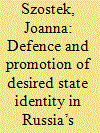

|
|
|
|
|
| Summary/Abstract |
This article examines how the Russian state promotes and protects its preferred self-identity, using the conceptual framework of ‘strategic narrative’. Nation branding practices, including state-funded ‘mega-projects’ like the Sochi Olympics, have contributed to the narrative by characterising Russia as a welcoming, attractive destination. However, a more salient feature of Russia’s strategic narrative is intense ‘anti-Western’ and ‘anti-American’ political and media discourse, formulated to defend against rival, threatening narratives projected from other countries. Through analysis of official statements and state television content, this article demonstrates how determination to protect ‘great power’ and ‘European’ identities underlay Russia’s strategic narrative in 2014. It considers responses which the narrative has prompted, arguing that desired results in domestic reception have been achieved at the expense of unsatisfactory results internationally. Heavy-handed attacks on the identities of other states boost collective self-esteem among Russian citizens, but they fail to produce – and arguably obstruct – desired responses among foreign audiences.
|
|
|
|
|
|
|
|
|
|
|
|
|
|
|
|
| 4 |
ID:
190059
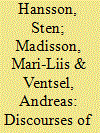

|
|
|
|
|
| Summary/Abstract |
Governments spread strategic narratives via media to influence foreign audiences and policy makers. A frequent but understudied feature of strategic narratives is the discursive construction of blame. In this article, we use the coverage of the adoption of 5G cellular technology in Russian state-funded news portals as an example to show how to interpret blame narratives about international security issues. We combine methods and insights from the discourse-analytic studies of blame and the research into the uses of strategic narratives in international relations to reveal how various articulations of blame are used to (de)legitimise particular actors and actions, sow discord, and foster alliances. Our analysis sheds new light on blame discourses that are more sophisticated and indirect than straightforward accusations and may serve multiple strategic goals at once. It also contributes to scholarship on Russia’s strategic communication about China as well as the United States and its allies.
|
|
|
|
|
|
|
|
|
|
|
|
|
|
|
|
| 5 |
ID:
175676
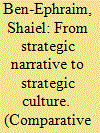

|
|
|
|
|
| Summary/Abstract |
Israeli strategic culture is offensive and militaristic. However, in the pre-state period the Labor Zionist elites which later dominated the Israeli security establishment formulated a security narrative trumpeting a defensive and antimilitaristic approach. This article explains that its security policy was designed to perpetuate domestic political hegemony. Since the Jewish people had not developed an approach to the use of force in centuries, the formulation of Labor Zionist approaches to security allows an insight into the process by which security narratives are initially derived and the process by they may (or may not) become a reified strategic culture.
|
|
|
|
|
|
|
|
|
|
|
|
|
|
|
|
| 6 |
ID:
179319
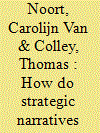

|
|
|
|
|
| Summary/Abstract |
Strategic narratives are increasingly considered important for domestic and international support for foreign policy. However, debate continues about why some strategic narratives successfully shape policy outcomes, while others are rejected. How states construct strategic narratives is well established. We know less about how states appropriate the strategic narratives of others, and the role this plays in policy adoption. Addressing this, we introduce a theoretical framework to trace the relationship between strategic narratives and policy adoption. Its central premise is that a state is more likely to adopt a new policy if it can strategically narrate about it in a way that promises material gain but without undermining its ontological security. We test our framework using states’ responses to China's Belt and Road Initiative (BRI). Examining the Second Belt and Road Forum in 2019, we trace how far China's strategic narratives are appropriated by multiple states – Kazakhstan, Italy, United Kingdom, Netherlands, United States, India, and Mexico. Countries appropriate China's narrative emphasis on connectivity, trade, and prosperity. However, they contest that China's intentions are benign, based on its human rights record, assertive foreign policy, and fears of indebtedness. Finally, we discuss our framework's utility in explaining what makes strategic narratives persuasive in International Relations.
|
|
|
|
|
|
|
|
|
|
|
|
|
|
|
|
| 7 |
ID:
151394
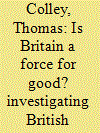

|
|
|
|
|
| Summary/Abstract |
It is commonly assumed in the foreign policy literature that narratives are uniquely persuasive and thus integral to obtaining public support for war. Yet, empirical research on “strategic narrative” is often vague on both the concept of narrative and how it persuades. Moreover, the stories publics use to interpret war are rarely examined. This paper offers a novel approach to studying “from the ground up” the war stories of individual British citizens. It examines public interpretations of war through emplotment: the way people select and link events to create a coherent story. Examining the wars people include and those they silence, it illustrates how a diverse range of citizens morally evaluates Britain’s military role, be it as a Force for Good, a Force for Ill or a country Learning from its Mistakes. In doing so, the paper offers an alternative methodological approach to studying how individual citizens understand war.
|
|
|
|
|
|
|
|
|
|
|
|
|
|
|
|
| 8 |
ID:
168955
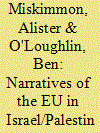

|
|
|
|
|
| Summary/Abstract |
Analysis of narrative can help identify the expectations actors hold about each other in international relations. This article triangulates a mix of elite interviews, media content analysis and an original Q-sort public opinion methodology to map the presence of narratives about EU relations among young Israelis and Palestinians. Our aim is not to explain the effects of EU public diplomacy in these countries. Instead we aim to identify the narrative “terrain” or conditions that the EU communicates to and with and, drawing on feminist and everyday narrative studies, to examine the role of affect and identity to explain why some narratives are more “sticky” than others in those societies. We find, first, a broad recognition that the EU’s capacity to act in international relations is necessary but limited in the face of greater challenges in the international system, and indeed, within the EU itself. We find, second, little evidence that young people radically reshape the narratives they encounter in their public spheres, but nevertheless some important divisions emerge that pose problems for how EU policymakers can communicate consistently without dismaying some citizens in third countries.
|
|
|
|
|
|
|
|
|
|
|
|
|
|
|
|
| 9 |
ID:
168957
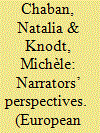

|
|
|
|
|
| Summary/Abstract |
The role of newsmakers as intermediaries in the shaping of external perceptions and reception of narratives advanced by different actors remains sparse in EU studies. This contribution fills this gap and addresses the personal images of the EU of newsmakers. We contribute to the understanding of those personal perceptions and their link to professional values of audience interest, newsworthiness and objectivity in reporting the EU. The article will demonstrate that all journalists perceive EU coverage in their respective locations are led by local priorities. Negative views of the EU as a weakening, biased, ineffective, elitist and arrogant actor are dominant. Arguably, they create conditions for the birth and dissemination of Euro-distant and even Euro-sceptic media narratives. The article will explain why this is the case while drawing on political/ideational and business/financial explanations.
|
|
|
|
|
|
|
|
|
|
|
|
|
|
|
|
| 10 |
ID:
168960
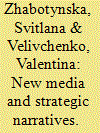

|
|
|
|
|
| Summary/Abstract |
This article analyses two confronting narratives authored by Ukrainian and Russian bloggers who reported the Dutch referendum held on 6 March 2016, and discussed Dutch citizens’ referendum vote on the Ukraine–EU Association Agreement. The considered narratives, addressed to the Ukrainian and Russian audiences respectively, are viewed as strategic because they specifically portray political actors of the referendum “drama” – the Netherlands, the European Union (EU), Ukraine and Russia. These actors are significant participants of European international relations, and their perceptions of one another are important for European security at the present time of critical diplomacy. In this paper, information about the DUTCH REFERENDUM obtained from the new media texts is regarded as a narrative-based political concept (NBPC). It is argued that this concept has different versions, or images that reflect the narrators’ biased perceptions imposed upon the public. Identification and comparison of such images require a particular methodology. Therefore, the objective of this paper is two-fold: to expose the two confronting versions of a strategically relevant political image, and to develop an authentic, interdisciplinary methodology for its analysis. The proposed methodology is informed by the ontology theory employed in cognitive science and cognitive linguistics.
|
|
|
|
|
|
|
|
|
|
|
|
|
|
|
|
| 11 |
ID:
168954
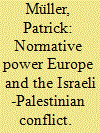

|
|
|
|
|
| Summary/Abstract |
This article conceives the EU’s normative power in the Israeli-Palestinian conflict as a narrative that projects views of the international system, the EU’s identity as a peacebuilder, and its positions on specific conflict issues. Highlighting the importance of local narratives as cultural filters, this article argues that a high degree of alignment of local narratives with key elements of the EU’s normative power narrative facilitates positive images of the EU as a normative power in peacebuilding, whilst diverging local narratives tend to give rise to more critical views. Yet, the case of Palestine also shows that strong narrative alignment with the EU may encourage high expectations, resulting in critical views about inconsistencies between the EU’s normative aspirations and its actual foreign policy conduct.
|
|
|
|
|
|
|
|
|
|
|
|
|
|
|
|
| 12 |
ID:
172234
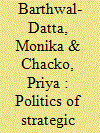

|
|
|
|
|
| Summary/Abstract |
This paper investigates India and Australia’s respective strategic narratives of regional order in the Indo-Pacific. Despite apparently significant convergences in their terminology around the desire for a ‘stable’, ‘prosperous’, ‘open’, ‘free’ and ‘inclusive’ Indo-Pacific, the regional order narratives of India and Australia each promote a distinct conception of regional order, reflecting different sets of political, geopolitical, economic and institutional concerns and agendas. India’s narrative promotes ‘issue-based’ alliances with a variety of countries including China, Russia and the United States, to promote a multipolar regional order, and reflects a long-standing desire to culturally identify and economically integrate with East Asian states. Australia’s narrative seeks to perpetuate the post-World War II status quo in the region, with respect to the continuation of a dominant US presence. It promotes closer partnerships with countries like India, Japan and Indonesia, within a US-led regional order, to diversify its economic and security relationships amidst perceptions of China’s growing assertiveness. It also carves out a central strategic role for Australia in a region where its leaders have traditionally felt like ‘outsiders’. The analysis advances a cultural political economy (CPE) approach to strategic narratives, demonstrating how and why strategic narratives are formed, projected and received at particular junctures.
|
|
|
|
|
|
|
|
|
|
|
|
|
|
|
|
| 13 |
ID:
153931
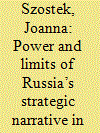

|
|
|
|
|
| Summary/Abstract |
Governments project strategic narratives about international affairs, hoping thereby to shape the perceptions and behaviour of foreign audiences. If individuals encounter incompatible narratives projected by different states, how can their acceptance of one narrative over another be explained? I suggest that support for the strategic narrative of a foreign government is more likely when there is social and communicative linkage at the individual level, i.e., when an individual maintains personal and cultural connections to the foreign state through regular travel, media consumption, religious attendance, and conversations with friends or relatives. The role of linkage is demonstrated in Ukraine, where a “pro-Russian, anti-Western” narrative projected from Moscow has been competing against a “pro-Western, anti-Russian” narrative projected from Kyiv. Previous accounts of international persuasion have been framed in terms of a state’s resources producing advantageous “soft power.” However, I propose a shift in focus—from the resources states have to what individuals do to maintain social and communicative ties via which ideas cross borders. In a competitive discursive environment such linkage can in fact have mixed consequences for the states involved, as the Ukrainian case illustrates.
|
|
|
|
|
|
|
|
|
|
|
|
|
|
|
|
| 14 |
ID:
177663
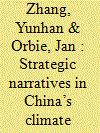

|
|
|
|
|
| Summary/Abstract |
During the past decade, we have witnessed a transformation in the role played by China in international climate negotiations, which has provoked increasing academic and policy interest. While most of the current research focuses on normative or empirical analyses of policies, this article provides a comprehensive study of China’s climate strategic narratives on both the systematic and national levels. Theoretically, this article situates itself in the ‘narrative turn’ in international relations. We develop an analytical framework that combines theoretical insights stemming from the strategic narrative with our own identification of the unique features of China’s discourse context. We apply this to China’s climate strategic narratives by examining China’s climate ‘discourse coalition’, which consists of the government, the epistemic community, and the official media. In doing so, we add to the current research that mainly focuses on the mass media. Methodologically, we critically examine four different sources of China’s climate strategic narratives, ranging from leaders’ speeches to media reports. This data is triangulated with 21 semi-structured interviews. Overall, we identify three phases of China’s climate strategic narratives. On a system level, the strict division between developed and developing countries has been replaced by the narrative of ‘a community of a shared future of mankind’; while on the national level, China as the victim of ‘ecological imperialism’ has given way to the new ‘torchbearer’ narrative. This research also contributes to a broader understanding on China’s domestic politics and its position in global governance.
|
|
|
|
|
|
|
|
|
|
|
|
|
|
|
|
| 15 |
ID:
168953
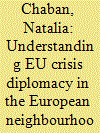

|
|
|
|
|
| Summary/Abstract |
This Special Issue seeks to better understand the role of communication and perception in EU crisis diplomacy. In a recent Special Issue in this journal, Catarina Kinnvall, Ian Manners and Jennifer Mitzen argue that, “ … the greatest security challenge facing people across Europe is not physical, despite the threats of Putin and ISIS, but is a sense of fear and anxiety over their daily lives” [2018. Introduction to 2018 Special Issue of European Security: “Ontological (in)security in the European Union”. European security, 27 (3), 249–265]. We take an interdisciplinary approach to widen the scope of studies on European security and offer new avenues for further research into how citizens in the EU’s neighbourhood understand the security challenges they face and the role the EU plays in addressing these. Through this, we aim to bring theoretical and methodological innovation to understanding the role of the EU as an external actor.
|
|
|
|
|
|
|
|
|
|
|
|
|
|
|
|
| 16 |
ID:
085480
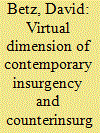

|
|
|
|
|
| Publication |
2008.
|
| Summary/Abstract |
This paper looks at the virtual dimension of contemporary insurgency and counterinsurgency. It argues that the West is faltering in the 'War of Ideas' with global Jihad for the main reason that the messages that we wish to convey lack narrative coherence. This is a result of the fact that we misapprehend the nature of the virtual operational environment whereas our opponents possess an intuitive grasp of it as a result of which their structure and method of operations are better adapted and more effective than our own. There is no reason, beyond inertia, that this should remain the case.
|
|
|
|
|
|
|
|
|
|
|
|
|
|
|
|
| 17 |
ID:
079235
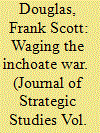

|
|
|
|
|
| Publication |
2007.
|
| Summary/Abstract |
This article answers three questions: What is the nature of the Long War? How is progress (or lack thereof) to be assessed? Where is it likely to go next? An appreciation of Clausewitz shows that practical centers of gravity exist for the Long War, and that the conflict pivots upon the ability to persuasively link ideology to events via a strategic narrative. A close examination of an illustrative case study, the interaction between the US and the late Abu Musab al-Zarqawi in Iraq 2004 - 2006, shows that Al Qaeda has suffered a severe setback, but also that the nature of the war is set to shift yet again. Further tangible progress for the US requires waging the Long War as a global counterinsurgency based on a strategy of 'selective identification' (versus pure 'disaggregation') as well as an understanding of how to more effectively craft a strategic narrative.
|
|
|
|
|
|
|
|
|
|
|
|
|
|
|
|
| 18 |
ID:
193228
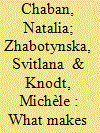

|
|
|
|
|
| Summary/Abstract |
Contributing to the ‘narrative turn’ in International Relations and offering an answer to the question ‘What makes a strategic narrative efficient?’, this article adds to the methodological theorization of the formation and projection phases of the narrative’s lifecycle. We suggest that the impact of the constructed image in the narrative can be reinforced by the interplay of at least three projection properties: (1) content accentuation and priming, through iterations; (2) content contextualization, through historical and cultural resonance with the consumers’ memories; and (3) content verbalization, through narrative tactics that evoke a range of the consumers’ involved attitudes to the framed image. These properties, being intrinsic ingredients of the projected content, tend to enhance emotions. In our work, they get traction in the antagonistic narrative tailored by the Russian propaganda to depict Ukraine orientated towards the European Union (EU). The empirical case study analyses articles published on the Russian e-news platforms portraying the EU granting Ukrainians visa-free travel to the Schengen area in 2017, a milestone in Ukraine–EU relations. We define Russia’s narrative, created in reaction to this event, as antagonistic and consider it to be a precursor of the aggressive narrative crafted/employed by Russia to justify its 2022 military assault on Ukraine’s sovereignty.
|
|
|
|
|
|
|
|
|
|
|
|
|
|
|
|
| 19 |
ID:
140951
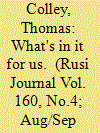

|
|
|
|
|
| Summary/Abstract |
Public support for military interventions is both critical to secure and invariably difficult to maintain. While foreign-policy specialists frequently underscore the importance of having a compelling strategic narrative to legitimise military intervention, most studies fail to explain how transmitted government narratives are actually mediated by the press and ultimately received by the public. Thomas Colley examines the public's response to the UK's strategic narrative on the 2011 military intervention in Libya, assessing the UK government's use of several strands in its messaging and exploring how these were mediated and received by the British media and public.
|
|
|
|
|
|
|
|
|
|
|
|
|
|
|
|
|
|
|
|
|